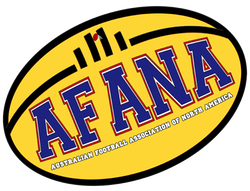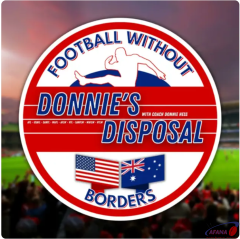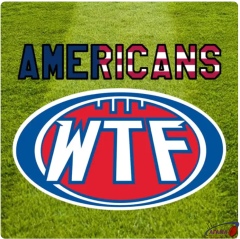by Johnson Leung reporting for AFANA from Melbourne
(updated 12/21/2014) Negotiations for the next AFL domestic broadcast rights deal have been postponed till 2015 as former League broadcaster and potential bidder Channel Ten considers several takeover offers. The AFL initially sought a broadcast deal that could last between five and ten years and bring in as much as A$3 billion for the period, however in November it told the market it valued the new deal at A$1.75 billion over five years. The current five-year, $1.253 billion broadcast deal (equivalent to US$1.37 billion at the time of announcement) with Channel Seven and Foxtel does not expire until the end of the 2016 season. However the AFL has repeatedly stated it is keen to complete a new agreement by the end of 2015, as the League cashes in on demand from the networks for live sports content and secures money to buy out Melbourne's Etihad Stadium. Discussions opened in November, after Chief Executive Gillon McLachlan returned from a short post-season break in early October, and took his plan for the ten year deal to the AFL Commission. Once it is approved, the League will issue tender documents to the commercial networks (Seven, Channel Nine and Channel Ten) and Foxtel.
There was a dramatic turn in early December however, when local media reported that Foxtel and US cable giant Discovery Communications had offered A$590 million (or about A$0.23 per share) to acquire Ten. Other potential suitors include private equity firms Anchorage Capital and Saban Capital Group. The AFL decided to put the talks on hold as it waited for Ten's future to be clarified, with the rationale being the new owners are likely to fund a major boost in Ten's program expenditure, especially in sports, to give the network the content needed to improve its ratings and revenue share, and the spending boost will improve McLachlan's chances of securing a record media deal.
While Seven is considered the favorite to retain the rights, Nine is set to be involved in negotiations now it has ownership of the Adelaide and Perth stations which were bought from regional broadcaster WIN in 2013, putting it on a level playing field wit Seven and Ten, both of which have stations in the country's five biggest cities. Ten is also expected to be a keen bidder after choosing to concentrate on winning the National Rugby League broadcast rights during the last negotiations. Ten shared the AFL broadcast rights with Nine and Foxtel between 2002 and 2006 and with Seven and Foxtel from 2007 to 2011, but withdrew from negotiations for the 2012-2016 deal, with the network at the time interested more in securing the NRL rights. The move backfired with Nine and Foxtel signing the 2013-2017 NRL broadcast contract worth A$1.025 billion (US$1.058 million at the time of announcement) with the Australian Rugby League Commission in August 2012.
As the No.3 Australian TV network, Ten believes it needs a major Australian winter sport to compete with Nine and Seven, even though it currently has the rights to televise international rugby union games in Australia during the local winter, and will broadcast V8 Supercars races from 2015 in a joint five-year deal with Foxtel worth A$241 million. As Seven currently has the rights to both sports, when the V8 Supercars races are held on the same weekends as the AFL from April to September, the V8 Supercars are usually televised on digital channel 7mate with the AFL on the main channel in Victoria, South Australia and Western Australia, much to the displeasure of motor racing fans and the V8's governing body.
CEO of media agency Carat, Simon Ryan, said the AFL rights were "absolutely crucial" to TV ratings and also the ability to cross promote other programming because "it brings not only ratings to the game, but it also brings more audience to the network, which the network can then publicize its other programs to get ahead of its other competitors ... it would be great to see the network that needs to lift its overall average ratings, such as Ten, get in there in some way, shape or form."
Media analysts believe a new five year broadcast deal could be worth about A$1.6 billion and a 10-year agreement between A$3.5 billion and A$4 billion. However, a number of experts are sceptical as to whether the AFL can generate more money for the new rights. Economist Tim Harcourt said that networks may be hesitant to splash out at a time when revenue streams are uncertain, due to a weak advertising market, increasing digitisation and the growth of new-age rivals such as Netflix. Mark McDonnell, analyst at stockbroker BBY, said the dynamic could work against the League this time after the networks bid frenetically for the 2012-2016 rights. "They face what is in the lingo called 'winner's curse'. That is, if you've won you've probably paid too much," McDonnell said. "It's a problem in the housing market in some parts of Sydney and Melbourne. I think it's one of the reasons going back a few years Seven and Ten teamed up."
Scott Barnes, head of sports, partnerships and activations at Ikon Communications, also questioned the ten year length of the proposed deal. He said "the media landscape is changing so rapidly the the length of the proposed deal is the most surprising thing for me ... When we look at the evolution of digital rights the code themselves will become their own media suppliers in years to come."
Another element to negotiations is likely to be the digital rights, as viewers increasingly migrate to mobile devices. Analysts have said the A$153 million paid by telco giant Telstra, for the digital rights as part of the 2007-2011 broadcast deal, looks like a bargain in hindsight due to strong digital ratings. For example, in a statement of fans on September 29, McLachlan said "AFL fans ... engaged with the game in record numbers on digital media as the swing to mobile and tablet devices gathers pace. The 2014 AFL Grand Final saw the AFL's digital network record more than 1.3 million visitors, up more than 40 per cent from the 2013 Grand Final."
The other issue at play, according to McDonnell, is that sports codes now generally expect more of their broadcast partners. They require all games to televised, which is great for advertising revenue when the top two teams are playing, but not so great for a bottom of the ladder clash. Networks have to re-engineer their schedules to account for such demands and, in turn, want to cash in by incorporating more related content elsewhere in their programming.
Sources: Herald Sun, The Age, The Australian Financial Review, mumbrella, author's notes
(updated 12/21/2014) Negotiations for the next AFL domestic broadcast rights deal have been postponed till 2015 as former League broadcaster and potential bidder Channel Ten considers several takeover offers. The AFL initially sought a broadcast deal that could last between five and ten years and bring in as much as A$3 billion for the period, however in November it told the market it valued the new deal at A$1.75 billion over five years. The current five-year, $1.253 billion broadcast deal (equivalent to US$1.37 billion at the time of announcement) with Channel Seven and Foxtel does not expire until the end of the 2016 season. However the AFL has repeatedly stated it is keen to complete a new agreement by the end of 2015, as the League cashes in on demand from the networks for live sports content and secures money to buy out Melbourne's Etihad Stadium. Discussions opened in November, after Chief Executive Gillon McLachlan returned from a short post-season break in early October, and took his plan for the ten year deal to the AFL Commission. Once it is approved, the League will issue tender documents to the commercial networks (Seven, Channel Nine and Channel Ten) and Foxtel.
There was a dramatic turn in early December however, when local media reported that Foxtel and US cable giant Discovery Communications had offered A$590 million (or about A$0.23 per share) to acquire Ten. Other potential suitors include private equity firms Anchorage Capital and Saban Capital Group. The AFL decided to put the talks on hold as it waited for Ten's future to be clarified, with the rationale being the new owners are likely to fund a major boost in Ten's program expenditure, especially in sports, to give the network the content needed to improve its ratings and revenue share, and the spending boost will improve McLachlan's chances of securing a record media deal.
While Seven is considered the favorite to retain the rights, Nine is set to be involved in negotiations now it has ownership of the Adelaide and Perth stations which were bought from regional broadcaster WIN in 2013, putting it on a level playing field wit Seven and Ten, both of which have stations in the country's five biggest cities. Ten is also expected to be a keen bidder after choosing to concentrate on winning the National Rugby League broadcast rights during the last negotiations. Ten shared the AFL broadcast rights with Nine and Foxtel between 2002 and 2006 and with Seven and Foxtel from 2007 to 2011, but withdrew from negotiations for the 2012-2016 deal, with the network at the time interested more in securing the NRL rights. The move backfired with Nine and Foxtel signing the 2013-2017 NRL broadcast contract worth A$1.025 billion (US$1.058 million at the time of announcement) with the Australian Rugby League Commission in August 2012.
As the No.3 Australian TV network, Ten believes it needs a major Australian winter sport to compete with Nine and Seven, even though it currently has the rights to televise international rugby union games in Australia during the local winter, and will broadcast V8 Supercars races from 2015 in a joint five-year deal with Foxtel worth A$241 million. As Seven currently has the rights to both sports, when the V8 Supercars races are held on the same weekends as the AFL from April to September, the V8 Supercars are usually televised on digital channel 7mate with the AFL on the main channel in Victoria, South Australia and Western Australia, much to the displeasure of motor racing fans and the V8's governing body.
CEO of media agency Carat, Simon Ryan, said the AFL rights were "absolutely crucial" to TV ratings and also the ability to cross promote other programming because "it brings not only ratings to the game, but it also brings more audience to the network, which the network can then publicize its other programs to get ahead of its other competitors ... it would be great to see the network that needs to lift its overall average ratings, such as Ten, get in there in some way, shape or form."
Media analysts believe a new five year broadcast deal could be worth about A$1.6 billion and a 10-year agreement between A$3.5 billion and A$4 billion. However, a number of experts are sceptical as to whether the AFL can generate more money for the new rights. Economist Tim Harcourt said that networks may be hesitant to splash out at a time when revenue streams are uncertain, due to a weak advertising market, increasing digitisation and the growth of new-age rivals such as Netflix. Mark McDonnell, analyst at stockbroker BBY, said the dynamic could work against the League this time after the networks bid frenetically for the 2012-2016 rights. "They face what is in the lingo called 'winner's curse'. That is, if you've won you've probably paid too much," McDonnell said. "It's a problem in the housing market in some parts of Sydney and Melbourne. I think it's one of the reasons going back a few years Seven and Ten teamed up."
Scott Barnes, head of sports, partnerships and activations at Ikon Communications, also questioned the ten year length of the proposed deal. He said "the media landscape is changing so rapidly the the length of the proposed deal is the most surprising thing for me ... When we look at the evolution of digital rights the code themselves will become their own media suppliers in years to come."
Another element to negotiations is likely to be the digital rights, as viewers increasingly migrate to mobile devices. Analysts have said the A$153 million paid by telco giant Telstra, for the digital rights as part of the 2007-2011 broadcast deal, looks like a bargain in hindsight due to strong digital ratings. For example, in a statement of fans on September 29, McLachlan said "AFL fans ... engaged with the game in record numbers on digital media as the swing to mobile and tablet devices gathers pace. The 2014 AFL Grand Final saw the AFL's digital network record more than 1.3 million visitors, up more than 40 per cent from the 2013 Grand Final."
The other issue at play, according to McDonnell, is that sports codes now generally expect more of their broadcast partners. They require all games to televised, which is great for advertising revenue when the top two teams are playing, but not so great for a bottom of the ladder clash. Networks have to re-engineer their schedules to account for such demands and, in turn, want to cash in by incorporating more related content elsewhere in their programming.
Sources: Herald Sun, The Age, The Australian Financial Review, mumbrella, author's notes
Article last changed on Sunday, December 21, 2014 - 7:17 AM EST






